With a recent milestone birthday, the Hockey Hall of Famer shares stories about family, friendship with Don Cherry, and a love for Anne Murray’s music.

Article content
As he heads down the homestretch toward his 90th birthday, Brian Kilrea remains a creature of habit. His regular routine includes making his morning coffee the night before, watching old TV episodes of Columbo and listening to a music mix which includes Neil Diamond, Frank Sinatra and Anne Murray.
For the stogie-smoking, beer-drinking, quick-witted Kilrea, routine is important. Always has been.
Advertisement 2
Story continues below
Article content
So are friends and family; they are everything to him. Always have been.
As the coach of the Ottawa 67’s for 32 seasons (nearly 40 years in different capacities), Kilrea was the merchant of venom, surgeon-like in his ability to cut through the B.S. and deliver a message to his players, sometimes with biting sarcasm, often littered with F-bombs.
He was part Archie Bunker, part stand-up comic, with some George S. Patton and Vince Lombardi thrown in.
If you played hockey under Brian Kilrea, sometimes you were in on the joke, sometimes you were the punchline. There was no coddling, no babying. Sink or swim.
He did it his way. Paul Anka wrote the song and Sinatra sang it, political correctness be damned.
“The things I’d say, you can’t say those anymore,” Kilrea said. “I might have used a bit of profanity. I couldn’t coach in today’s world. You have to be careful, you can’t hurt people’s feelings.”
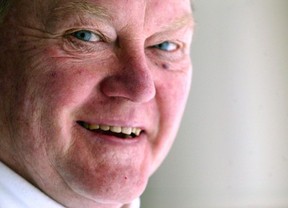
There are so many layers in his connection with hockey. But this is a story about a regular guy, a coach who gave a damn about his players and showed it in his own way.
There’s no pretense, no bullshit. What you see is what you get. Always.
Advertisement 3
Story continues below
Article content
Brian Kilrea is an Ottawa superstar, though with humility, he looks at it through a different lens.
“I don’t consider myself a legend. I don’t put myself on a pedestal,” Kilrea said. “There are certain people that are legends … Bobby Orr, Gordie Howe, Jean Beliveau. I’m not in that class.
“I’m ordinary. I enjoy a beer, I enjoy a cigar. I’m grateful for the life I’ve lived.”
His secret to a long life?
“Hockey always made me feel younger,” he said. “And, I’ve had a lot of good doctors, my wife (Judy), too.
She makes sure I eat my veggies and get a lot of rest. She tries to cut down on me smoking cigars and my beer consumption. She’s tried her best.”
The story of Brian Kilrea, hockey guy, family guy, is long. There’s no other way to tell it.
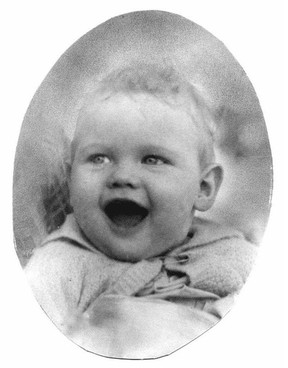
ONCE UPON A TIME, THERE WAS A LITTLE KILLER
The son of Jack and Beatrice Kilrea, Brian was born Oct. 21, 1934 at the Grace Hospital in Ottawa.
As a baby, he was nicknamed Giggles (it was later shortened to Giggy, then Gig) because he was a happy kid, always smiling.
The family lived at 193 Hawthorne Ave. He had an older brother Johnny, who died a few years ago. Johnny played the violin and football. There is also his sister, Bonnie, a longtime hairdresser who lives in the west end.
Article content
Advertisement 4
Story continues below
Article content
Their father Jack was quiet, but he could be tough.
“He used to come to my ballgames, he came to my hockey games,” Kilrea said. “He didn’t say a lot, but If he said something, you’d listen.”
Jack operated Kilrea’s Photo (Brian worked in the back, developing and printing), while Beatrice worked for the government.
“My dad would open the shop, come home for dinner at 6:30, he’d go back until one,” Kilrea said. “He had to open the shop early the next morning. He worked hard. His heart gave way at 70. It’s no wonder. He worked and worked and worked. In those days, you had to.”
When Kilrea was growing up, he’d watch The Ed Sullivan Show and Perry Mason on the black and white TV and lay in front of the radio and listen to New York Rangers games, trying to understand what the announcers were saying through the static.
Kilrea remembers going up the tracks to the Auditorium to watch the Ottawa Commandos, a war-time hockey team.
Like most kids of days gone by, much of his early life would be spent outside with hockey in the winter, baseball in the summer.
“It was a different life,” Kilrea said. “The kids now are inside dickey-dooing with their computers.”
Advertisement 5
Story continues below
Article content
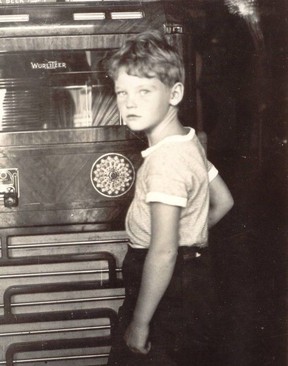
A LOVE FOR HOCKEY IS BORN
Kilrea’s first hockey memories come from the neighbourhood outdoor rink.
“I’d leave at eight on a Saturday or Sunday morning and wouldn’t go home until six or seven,” Kilrea said. “You’d stay until it was dark. … In the afternoons (when I was working), we’d have a bit of a slowdown (at the photo shop). My dad would let me run down to St. Luke’s Park (Gladstone and Elgin). I’d shoot pucks and skate if nobody was on the rink. If there was, I’d skate on the oval. Then I’d race back to work.”
Even the weekly trip to church was taken with skates slung over his shoulder.
“I’d go to Sunday School at Calvary Baptist Church and there was a rink not far away,” he said. “I’d bring gloves, a stick and my skates and put them under the church steps. When Sunday School was over, I’d go to the rink.”
Kilrea was inspired by his uncles Hec, Wally and Kenny, who all played in the NHL.
“I wanted to be a hockey player because my uncles were,” he said. “Anytime they came to visit, I sat and listened to every word.”
Kilrea played for a year on a team sponsored by the Church of the Ascension. He also played for Ottawa East and the Montagnard juvenile and junior teams. Kilrea’s education switched exclusively to the ice as a teen.
Advertisement 6
Story continues below
Article content
“Going into Grade 11, I was walking down the street, near Lisgar,” he said. “I saw what looked like a huge rink across from where we had the outdoor rink. I said to somebody, ‘Oh, they built a rink for us,’ The guy said, ‘No, that’s a gymnasium for basketball.’ I asked, ‘Where are we playing hockey this year?” He said, ‘No hockey this year.” I said, ‘What am I doing here? Algebra and trigonometry aren’t going to make me a better hockey player.’ I walked back to my dad’s shop and told him, ‘I just quit school.’
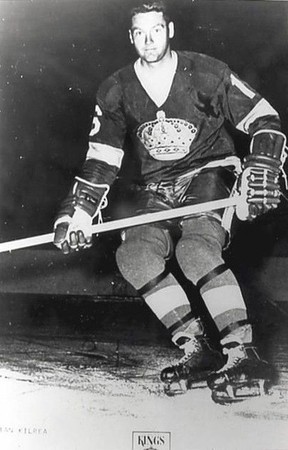
A LIFE ON THE ICE BEFORE A LIFE BEHIND THE BENCH
Kilrea was asked to play for Brockville’s senior team in the playoffs. He got paid $12.50 a game for 24 playoff games.
“I couldn’t believe I was getting paid that much,” Kilrea said. “I’d put it in a drawer. My mother told me I should have a bank account. I’m still at the same bank.”
When he was 17, he was signed by the Hamilton Tiger Cubs junior team and was there for two seasons. He then played four seasons with the Troy Bruins where he was a second-team all-star in 1958-59. He was spotted by Eddie Shore and signed to play with the American Hockey League’s Springfield Indians.
Advertisement 7
Story continues below
Article content
His arrival in Springfield in 1959 coincided with the team’s run of three straight Calder Cup championships.
Kilrea didn’t miss a regular-season game over four years from 1961-1965; in 1961-62 he led the league with an eye-popping 73 assists, establishing a career high with 93 points. He’d also play in Vancouver of the WHL and Tulsa of the CHL.
“My first contract in Springfield was $4,000 a year, plus I’d get a $500 bonus,” Kilrea said. “If I made the team, I’d get $1,500 more. We won the Calder Cup and I got a bonus for that.
“Eddie used to give us $3 for three meals. The steak was $3.50. I didn’t care, I didn’t short myself; my mother always told me, no matter how much money you have in your pocket, don’t short your stomach.”
Because he became such a successful coach, Kilrea’s hockey skills sometimes fly under the radar. He was a helluva hockey player. It was much tougher to get a promotion to an NHL team in Kilrea’s prime; there were only six teams, making roster openings scarce.
Kilrea would play 26 NHL games – one with the Detroit Red Wings during the 1957-58 season, then 25 with the Los Angeles Kings in 1967-68 when he had three goals and five assists. He also provided the answer to a hockey trivia question, scoring the first goal in the Kings’ history.
Advertisement 8
Story continues below
Article content
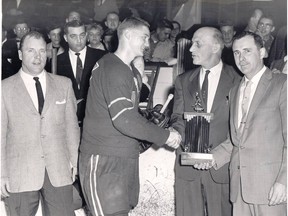
IN THE DEEP END WITH EDDIE SHORE
Eddie Shore was a rugged NHL defenceman nicknamed Old Blood and Guts. He was a curmudgeon who became a minor-hockey hockey league owner, running the Springfield team.
“Eddie toughened me up,” Kilrea said. “There was no such thing as a star in his mind. He was mean, he was difficult. He’d be hard on the littlest things, like moving the puck quickly, getting your feet underneath you, having balance, then moving it, moving it, moving it. It’s something I carried with me all my playing years, then coaching. They’d always say, ‘This Ottawa team is probably the quickest skating team.’ No, it was the illusion we were the quickest because we kept advancing the puck.”
Along with Alan Eagleson, Kilrea helped plant the seeds for what was to become the NHL Players Association. Kilrea was a leader in a players’ strike against the crusty Shore in the 1966-67 season.
“I was a spokesman,” Kilrea said. “We had to get affidavits. I had some beauties.”
“One game, I got cross-checked. After, Shore came in with his doctor. I said, ‘I’m having trouble breathing.’ His doctor gave me a bearhug and I could hardly breathe. The doctor said, ‘You’re all right.’ We got on a night train to Montreal, then we got on a bus to Quebec. I had a sore back, but you never complained – the treatment was always worse than the injury. So, we play. (After the game) I couldn’t take a deep breath, I was on my hands and knees. I call a cab and go to the hospital. The doctor said, ‘You have two broken ribs and a cracked third rib, you’re going to be out for two or three weeks.’
Advertisement 9
Story continues below
Article content
“I go back to the hotel and tell (coach) Pat Egan, ‘I have two broken ribs and a cracked third and I’m out for two or three weeks.’ Shore comes into the lobby and asks, ‘Who told you to go to the hospital?’ I said, ‘I told myself, I couldn’t breathe. They did X-rays I’ve got two broken ribs and a cracked third.’ He said, ‘Sit back and visualize it, you’ll be all right. You’ll be in the lineup Tuesday.’ I played, otherwise I would have been suspended. I never missed a game. I guess it healed, I stopped feeling pain after about three weeks.”
And, there’s this: “We were in the playoffs and I broke my jaw on a Wednesday. They sent me to the hospital. They told me, ‘We’re going to wire you, you’re out for the year.’ They couldn’t operate on Thursday because it was too swollen so they did it Friday. I got out Saturday, and they told me, ‘By the way, Eddie wants you to go directly to the rink.’ I got there and there was no, ‘Hello, how are you feeling?’ Eddie says: “Get your stuff on.’ He got Pat Egan on the blue line to his left and me to his right. He said, ‘I want you to hit and see if you can absorb pain.’ Pat tried to knock me down. I did it from the other side, Shore said, ‘How does that feel?’ I said, ‘It hurts.’ Shore said, ‘If you just sit back, you’ll be all right, protect yourself with your stick. You’re in the lineup tonight.’ I played. The doctor who did the operation saw me on the ice. He went to Shore and said, ‘Get him off, one more hit and he could be talking through clenched teeth for the rest of his life.’ I played that period, then they took me off. Do you know what kindly old Shore did? I became a Black Ace. I had to report at 8 the next morning. I went from 8 to 10 a.m., then 12 till 2 with the regular team. He knew I couldn’t play the rest of the year, he was just being Eddie Shore, thinking, ‘You’re not going to sit around, collect your money and do nothing.’ ”
Advertisement 10
Story continues below
Article content
Years later, Shore’s brother-in-law Jack Butterfield, the former president of the AHL, reached out to Kilrea and asked if he could call Shore, who was ailing, to cheer him up.
“I call his hidden number,” Kilrea said. “I say, ‘Mr. Shore, it’s Brian Kilrea.’ He says, ‘How’d you get my number?’ I said, ‘I got it from a friend. I’m wondering if you’d like to come up and get on the ice with my team.’ Click. He hung up the phone. That was the last time I talked to him. He was going to stay a miserable human being until the end of his life.”
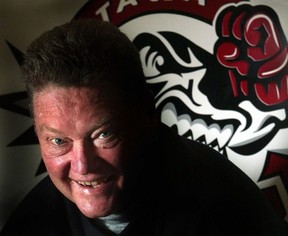
QUICK SHIFT: BECOMING KILLER
Along with the way, Brian Kilrea became Killer. Not Killer Kilrea. Just Killer. He had been sent to Troy, Ohio, where Nellie Podolsky was the coach.
“Stevie Gaber, their best player, asked Podolsky, ‘Who’s this guy?’ Nelly said ‘Kill, Kill something.’ Stevie said, ‘Killer?’ Nelly said, ‘Yeah, maybe it’s Killer.’ When Stevie saw me, he said, ‘If he’s a Killer, he’s a babyface Killer.’ Lucky the babyface got dropped and it was just Killer.”
HOW JUDY STARTED HER HUSBAND’S LEGENDARY CAREER
When his playing days were finished, he had no intention of continuing in hockey. None.
Advertisement 11
Story continues below
Article content
He got into the restaurant industry and continued that involvement for several years. Becoming a hockey coach was accidental. As fate would have it, Judy had registered their son Billy to play minor hockey and offered her husband as a coach for the tyke team.
At the time, he had no idea he was taking his first strides down a path that would last most of the rest of his life. But Kilrea began doing what Kilrea does, and he sees things differently. He could take the most complicated of situations and simplify it into a sort of Hockey for Dummies.
An Ottawa West Midget AA team he was coaching battled to a stunning tie with a powerful touring Soviet squad. His philosophy: Don’t be intimidated by the flash, don’t pay attention to the Russians flying around the ice in warmup. Hit them. Knock them off the puck.
The strategy paid off for the heavy underdogs and it put the coach in the spotlight. He was offered the 67’s coaching job, replacing Leo Boivin at the start of the 1974–75 season.
After a stretch of success with the 67’s, he was hired as an assistant coach by the New York Islanders, the defending Stanley Cup champions, in 1984. He was there for two seasons, then returned to the 67’s. He stepped aside again, for the 1994-95 season, then got behind the bench until the end of the 2008-09 season.
Advertisement 12
Story continues below
Article content
“The National League wasn’t the same,” Kilrea said. “In the National League, you didn’t really teach. … I loved the Islanders, there were so many great players who were so humble. But it just didn’t work out. When I came back, I realized what I missed; it was the teaching part. I’m glad I took the chance, but I’m glad I spent the rest of my time in junior.”
In October of 2014, Kilrea returned to the 67’s bench for one game in the month of his 80th birthday, making him the oldest person to coach a CHL game.
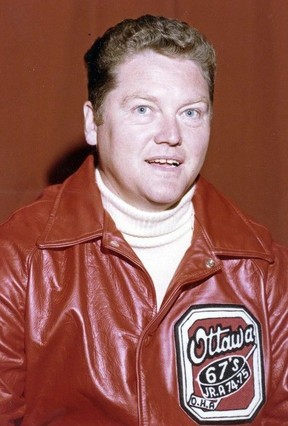
QUICK SHIFT: HALL OF FAME RESUME
Kilrea was a five-time OHL coach of the year, two-time CHL coach of the year, he won three OHL championships and two Memorial Cups (1984 and 1999). He coached in 2,156 games and won 1,193 times, more than any coach in CHL history.
In 2003, Kilrea was added to the Hockey Hall of Fame (as a builder, inducted alongside Grant Fuhr, Mike Ilitch and Pat LaFontaine.
“I thought it was a prank at first, what did I ever do?”,” Kilrea said. “I didn’t think I was in the class of the Hall of Famers.”
TALES OF GRAPES AND KILLER
Don Cherry is a friend. Kilrea hasn’t seen “Grapes” in a couple of years, but they still talk.
Advertisement 13
Story continues below
Article content
“I knew him as a player and I knew him as a coach,” Kilrea said. “You’d want him on your team. He didn’t care if he ever got a point, all he wanted to do was win. … He was always set in his ways, if he had something on his mind, he would say it.
“Now … he’s happy in his world and I’m happy in mine.”
There are plenty of stories about Cherry, classics that become funnier when narrated by Kilrea.
“He called me one year and asked me to run his hockey school, he had to coach in a hockey tournament in Europe. I went down to Rochester,” Kilrea said. “The first day, I get there early to do my shift, I had nowhere to go so I stayed to watch. The players are on the ice and there’s no instructor. I saw this guy having a coffee. I said to him, ‘Hey, are you supposed to be on the ice?’ He said, ‘Yeah, I’ll get there.’ I said, ‘Well, you’re supposed to be on the ice with those kids now.’ He said, ‘When I get there, I’ll get there.’ I said, ‘Never f—ing mind, take your coffee and go drink it at home.’ I put my skates on and ran his drills.
“It was Don’s best player in Rochester. Don calls later and says, ‘How did the first day go?’ I said, ‘I fired so and so.’ Don says, ‘What?’ I say, ‘He was having a coffee and talking when he was supposed to be on the ice with the kids.’ Don says, ‘OK.’ ”
Advertisement 14
Story continues below
Article content
When Kilrea tells a story, you listen. You know it’s going to be a good one.
“Don had an old Pontiac,” Kilrea said. “One day, he says to me, ‘I’m going to burn my car. It’s near the end and I know nobody would ever treat it the way I do.’ You never smoked in his car, you didn’t get in with dirty boots. It was always clean. That same day, Lynn Zimmerman, our goalie, comes in and says: ‘S–t, my car just died, I have to buy a car.’ I said, ‘Go talk to Don, he’s going to cremate his because he doesn’t think anybody will look after it.’ They talk. Lynn says he’s going to take the car. Don told him the first time he sees ashes in the ashtray or sees the car dirty, he’s taking it back and burning it. Five years later, Lynn was still driving that car. Don said to me, ‘I should have kept it.’ ”
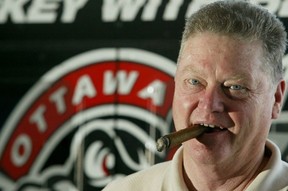
QUICK SHIFT: THE VICES
Beer and cigars are still very much part of Kilrea’s life.
“Beer was in our house when I was growing up,” he said. “Mom and dad liked Dow. Saturday nights, all the oldtimers would come to visit, they’d come with their wives. Sometimes they’d play euchre, sometimes they’d sit and tell stories. I was the runner. If they needed beer, I’d get it for them.
Advertisement 15
Story continues below
Article content
“I started with Carling Red Cap, I grew up with that. Down in the U.S., it was Budweiser, I love Bud. When my brother got a job as a rep at Molson, I was into that.”
And, the cigars?
“I had an uncle that used to sit at the table and smoke White Owls; I enjoyed the smoke,” Kilrea said. “Doctors have told me to cut down. But there are certain things you enjoy.”
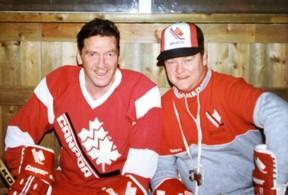
A LIFETIME OF STORIES FROM THE RINK
Many of the players who wore the colours of the 67’s during the Kilrea era loved the coach. Others didn’t like his no-nonsense, in-your-face style. He pushed the players to be better; his “encouragement” was often decorated with F-bombs.
He wanted the kids to be the best they could be, not only excel in hockey, but be ready for whatever was ahead off the ice.
“I’m sure not all players I coached liked me; some did, some didn’t,” Kilrea said. “You try and get the best out of them for themselves and for the team.”
Kilrea didn’t rehearse what he was going to say to the team or players.
“It was spontaneous,” he said. “People ask me, ‘What’s the best speech you ever made?’ I say, ‘I never asked the players to win one for the Gipper.’ Humour was probably the biggest secret to our dressing rooms.”
Advertisement 16
Story continues below
Article content
Kilrea cared, he never stopped caring.
“I got a challenge my first day of camp when I took over the 67’s,” Kilrea said. “Timmy Young was the star of the team. Something happened and he threw his stick into the seats. I blew the whistle and said, ‘You have a choice. Go get your stick, or get off the ice because you can’t play without one.’ A fan went to get the stick. I said, ‘No, leave it there. If he wants it, he can get it.’ I made him go up those cement stairs, get the stick and come back on the ice. It was a nice test.
“(Young) told me he wanted to be traded. I put him up for trade, I had one offer, from my friend Frank Bonello in Toronto. He offered me a guy who had an Achilles tendon operation. I said to Timmy, ‘I have one offer for you – the guy may not play because he had an Achilles operation.’ (Young) called me the next day and said, ‘You told me you never hold a grudge?’ I said, ‘I don’t.’ He asked if he could come over (to my house) and watch the hockey game. He came over. From then on, Timmy Young was our leader.”
Stories? Kilrea can tell them all day.
“I had one player that didn’t want to be here,” Kilrea said. “I kept saying, ‘Move the puck, move the puck.’ One day he shot the puck at me, I was on the bench during a game. We traded him. I won’t mention his name.”
Advertisement 17
Story continues below
Article content
Then there’s this: “Brad Shaw was a magician with the puck, he could stickhandle. I wanted him to move the puck, don’t make the forwards wait. One time, he was going to move it, then he deked. I went to Brad and said, ‘The only guy you missed stickhandling around is sitting up in Section 25.’ Everybody got a kick out of it.”
And, this: “Mike Hodgins takes a bad penalty. He takes another bad penalty. The problem with bad penalties is when the other team scores, its worse. We’re playing the Marlies and they score twice. It comes to the third period and he’s planted on the bench, we can’t have him taking any more penalties. There are probably 200 of (his schoolmates) at the game. They start chanting, ‘We want Hodgins, we want Hodgins, we want Hodgins.’ I saunter down the bench, I say (to Hodgins), ‘Mike, if you want, you can take your stuff and go sit with the fans up there … they want you more than I do.’ I had trouble keeping a straight face, I had to walk away. Mike is kicking the boards. Doug Wilson is laughing and falls as he’s trying to get over the boards.”
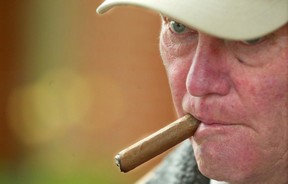
PLAYER TESTIMONIALS: ‘YOU CAME IN A BOY AND LEFT A MAN’
Advertisement 18
Story continues below
Article content
Shean Donovan, 67’s player from 1991-95, played for seven NHL teams over 951 games (from 1994-2010).
“(Kilrea) was old school, he came from Eddie Shore and that way of coaching,” Donovan said. “I got to know him later and you see what kind of mind he has, he’s brilliant. He’s got a gift. He didn’t have a million rules. But when you messed up, you heard about it. He could be hard on us. But he was also sarcastic and funny.”
That brings us to a story that’s been retold many times.
“I was a right winger,” Donovan said. “(Kilrea would say to me), I can’t tell if you’re playing right wing for us or left wing for them.’ He said that a bunch of times.”
And another … “I got into a fight against a tough kid. I was 16, I was a couple of years younger. It was probably my first real fight. I was excited because I stood up for a teammate. But I got kicked out of the game. My nose was busted up and I was going by the bench. Killer says, ‘Where are you going?’ I said, ‘Coach, I got kicked out.’ He said, ‘You’re the first f—ing guy I’ve ever seen get kicked out of the game for getting the f— beat out of you.’
Years later, Donovan got it, he understood the whys.
Advertisement 19
Story continues below
Article content
“I remember I was playing in Pittsburgh, the 67’s were playing in Erie — we had a day off so I went to watch,” Donovan said. “I think they were winning by one or they were tied after one, but they weren’t playing great. I was outside their dressing room and (Kilrea is) losing it, yelling and tearing a strip off them. He came out, saw me, gave me a wink and said: ‘You used to be afraid of that, weren’t you?’
“He did a good job of weeding out the players who really wanted to move on and play hockey and the ones who didn’t.”
Zenon Konopka, 67’s player from 1998-2002, played for seven NHL teams over 346 NHL games (from 2005-14).
“They only made one Brian Kilrea,” Konopka said. “If you lasted in Ottawa for more than a year, you came in a boy and left a man. He was always softer on the rookies, you got a free pass. If you made it through that second year, you could make it through a lot of things in life. You grew up as a hockey player, you grew up as person.”
And, a story: “We had a 4-in-4 (games in nights) every year: Sarnia, Windsor, Plymouth, then London on Sunday afternoon,” Konopka said. “Guys who were above 19, if we played a good game, we’d get some beers. Jon Zion was my roommate. We’re away for going on five days. We always wanted more responsibility. Killer calls and says, ‘I’m coming to your room, we have to have a serious conversation.’ He comes into our room and says, ‘I got a call from the hotel there’s a room that’s full of trash.’ We said, ‘That’s unacceptable. Tell us whose room it is, we’ll fix this, don’t worry.’ He looks around and says, ‘You stupid f–ks. You idiots, it’s your room.’ We’d had guys in our room every night. He’s yelling at us, then he walks out and slams the door.
Advertisement 20
Story continues below
Article content
“You didn’t get a leg up on Killer very often. Some of the stuff he did, I think he calculated, ‘I’m going to screw with this guy or that guy for the team to come together.’
And how does he look at his former coach now?
“Killer’s a loyal guy, he’ll do anything for you,” Konopka said. “Maybe there’s something to be said for doing something you love to do in your life. He loved hockey. That helps him, I think, in his joy for life. He did something right if he’s still kicking at 90.”
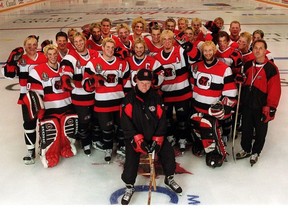
KILREA’S MOST IMPORTANT TEAM
The hardened hockey player’s life took a life-changing turn when he met Judy. He was introduced to her by a friend in Winnipeg. He took her to a game, then stayed a few days. His friend was getting married and asked Kilrea to be there. He returned to Winnipeg, spent more time with Judy and the love connection was sealed.
“It was a quick romance,” Kilrea said. “She was easy to get along with, she has a sense of humour and she’s pretty good looking.
“She’d never argue with me, she’d walk away and say, ‘You win, you’re the loudest.’ She never complained if I went from one team to another. We’d just pack up and take the kids.”
Advertisement 21
Story continues below
Article content
Judy, who’s 88, laughed when asked what it was about her husband that attracted her.
“We haven’t figured out what it is yet,” she said. “He’s happy when he’s at home, he’s relaxed. If he was shouting here, nobody would listen.”
They bought a bungalow in Ottawa’s Canterbury area in 1959 and have lived there since.
They have three kids (Billy, Dianne and Linda), nine grandkids (Paige, Morgan, Dan, Dave, Jack, Katie, Ben, Ryder and Nigel) and three great grandchildren (Sophia, Mac and Maeve).
“I think of him as a family man. He loves his family, he loves the grandkids and great grandkids,” Judy said.
Ottawa, to Kilrea, has always been home, his happy place.
“I know Ottawa is a large city now, but in my day, it wasn’t,” Kilrea said. “They used to call the Prescott the Last Chance, the last chance you’ll get a beer going west. They said the Civic Hospital was too far out of town when it was built. Now, it’s probably in the centre. I’ve always loved to Ottawa.
“I lost a job in the National League because a team said, ‘You’re going to have to live here if you coach here.’ I said, ‘I’ll coach there, but Ottawa is my home.’ ”
Advertisement 22
Story continues below
Article content
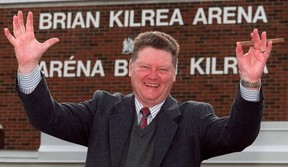
QUICK SHIFT: ON THE BUS WITH ANNE MURRAY
Kilrea likes listening to Neil Diamond, but Anne Murray was always a favourite; Kilrea loves her voice, loves the music. Years ago, the 67’s Booster Club got him a ticket to see her perform at the NAC. John Allan Cameron got him backstage to meet Murray.
“She’s the greatest,” Kilrea said. “When I think of great Canadians, I think of Paul Anka, I think of Anne Murray, and naturally, I think of Don Cherry.
“One time, the guys were playing some of that loud stuff on the bus. I told them they had a choice, turn it down or turn it off. So, I had Anne Murray playing. We leave Ottawa and go to Sault Ste. Marie. There was a story that came out in Toronto where I had said, ‘Anne Murray doesn’t know, but she sang for 500 miles, to the Soo.’ Her publicist read the story and got her to sign an album for me, it said, ‘Now I know … Anne Murray.’ To me, that’s a keepsake.”
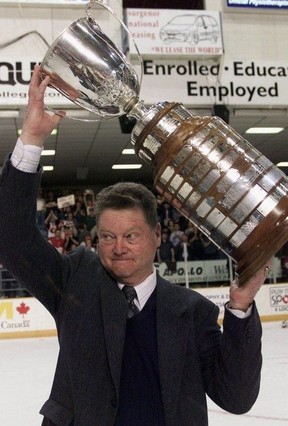
90 YEARS IS A LONG TIME
There’s a long list of health issues, but Kilrea always shrugged them off, no doubt toughened up by his experiences with Shore.
It’s a stat sheet he’d rather not have, but the reality is it’s what happens when you wake up in the morning so many times.
Advertisement 23
Story continues below
Article content
There was spinal fusion in 1969, melanoma in his back in 1978, kidney stones in 1988, a cyst in his throat in 1991, shingles in 1993, pneumonia twice, melanoma in his leg in 2005, a heart attack in 2012, prostate cancer in 2018 … then there were the hockey injuries.
“I have to put together a list to thank so many doctors for keeping me here,” Kilrea said with a laugh.
Near the end of a season while playing in Tulsa, the pain in his back got so bad, Kilrea, who couldn’t bend over, got the trainer to tie his skates. Kilrea had spinal fusion.
“I asked the doctor if he thought I’d be ready for training camp, he said, ‘I can’t guarantee you’ll even be skating again.’ ”
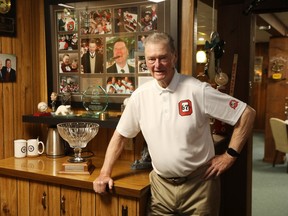
When he’s not golfing, he walks around the neighbourhood a couple of times a day.
Said Kilrea: “A doctor friend of Judy’s dad, he was in his 80s, kept going to the Y and riding the bike, he’d come to the cottage and say, ‘Take care of your legs.’ I still remember that.”
A few years back, he was golfing in the Old Pros tournament. He got to the third or fourth hole and started feeling pain in his back.
“I didn’t think it was a heart attack because the heart’s not at the back,” Kilrea said. “I didn’t know what it was. I was always looking forward to the halfway house at Hylands, the hot dogs were the best in town. I started to get heartburn. I thought it was just indigestion. I took some Tums, it didn’t work. I finished the nine, just putting, then I said I should go home. The pain was still there a bit. The next day, I went to see our grandson play ball and the pain came back. About 10 o’clock at night, I got up and had a shower. I told Judy I was going to call the ambulance, the pain was getting to me. Judy asked why I had a shower, I said, ‘I’m not going to the hospital dirty.’
Advertisement 24
Story continues below
Article content
“When they did the tests, they found I’d had a heart attack. They were going to just put in a couple of stints, the doctor said that wasn’t enough. They booked me for seven the next morning and told me I was going to have a triple bypass. I didn’t have time to worry.”
Most painful was probably the issue with kidney stones.
“They went into my kidney to cut it out. It was more painful than anything, more than the broken ribs, the broken jaw, the heart attack,” Kilrea said.
“Brian never seems to make it a big issue,” Judy said. “Whatever will be, will be. He has a high pain threshold.”
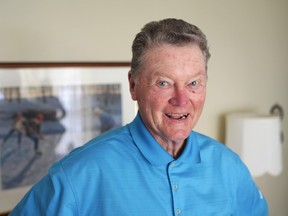
QUICK SHIFT: GOLF
Golf is something Kilrea took up later in life.
“Eddie Shore made us go out and play golf one day,” Kilrea said. “After about three or four holes, I saw Shore was out of sight and I left. I always thought golf was a rich man’s game. Obviously, a lot of ordinary people play it.”
He’s a member at Rideau View and tries to play three times a week.
“I enjoy my time at Rideau View because they’ve been so good to me and there are so many nice people there,” he said. “I play with the same three guys: Bert O’Brien, Brian Ladas and Gordie Gravelle.
Advertisement 25
Story continues below
Article content
“I don’t really have a backswing, I have pretty good wrists. I usually hit it straight. I’m not a bad putter because I used to play a lot of pool. I had a pretty good touch on the table so that helps with putting. Last year, I had a couple of scores in the high 90s, I usually shoot around 100.”
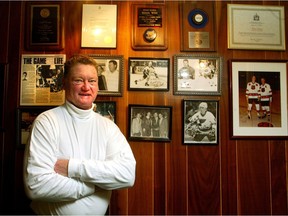
LIFE WELL LIVED
Kilrea wakes up early each day, between 6:15 and 6:30 and pushes a button to heat up the coffee he’s brewed the previous night. He’ll have two cups of coffee and a muffin.
His life journey has given him so many blessings.
Family. Friends. Hockey. It’s been a hall-of-fame life on and off the ice.
“I know how lucky I am,” Kilrea said. “To have the life I’ve had. I’ll never forget my dad, he was on his deathbed and he said: ‘Gig, I’ve had 70 good years.’ He didn’t have 70 good years, he worked like a dog, long hours. I figure I’ve had 20 more years than him and it’s been a hang of a lot easier. If he could be happy at 70, I can be happy at whatever number I get.”
Having friends who are there for the best and worst of times is a big part of it. Among those in his circle of friends the past several years: Don Cherry, Patty Higgins, Nick Bouris, Stump Craig, Garry Hamilton (a cousin) and Bert O’Brien. There have been others.
Advertisement 26
Story continues below
Article content
“Friendships might be the biggest thing to a long life,” Kilrea said. “They say you’re lucky if you can have good friends in life. I’ve been really lucky.”
After Kilrea and O’Brien, who would become a longtime 67’s assistant coach, met in the 1970s, they became best buddies.
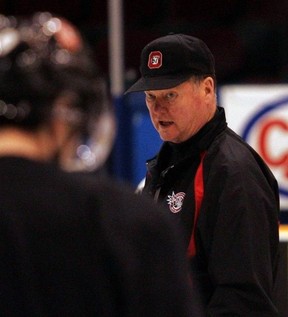
O’Brien was a key component of the successful 67’s teams, the yin to Kilrea’s yang.
“Bert never got enough credit for being as good a coach as he was,” Kilrea said. “He’s an easy-going guy with a great eye for talent. He was understanding and worked well with kids. We didn’t always agree. But we talked it out and solved whatever it was.”
The friendship means a lot to O’Brien.
“Brian is the best friend you’d ever want,” he said. “I’m treated like I’m part of his family; he’d do anything for me … and I’d do anything for him.”
Approaching a monumental birthday, Kilrea’s philosophy is simple in theory, but hard in practice.
“I’ve got no regrets,” Kilrea said. “My dad told me things always work out for the best, I lived by that.”
After returning to Ottawa during his playing days, he once asked his dad why he had to stay in the minors with Eddie Shore when other guys were getting called up to the NHL.
“My dad said, ‘Don’t worry about it. Just do your best, things will work out.’ As it turned out, I ended up being a coach for years, I got voted into the Hockey Hall of Fame, the Sports Hall of Fame here in Ottawa, the Ontario Sports Hall of Fame, the American Hockey League Hall of Fame. Things did work out for the best.
“Maybe I could have gotten a year or two in the National Hockey League, but would I have been able to get the job with the 67’s? I don’t know. It worked out perfectly.
“The fridge is full, the cigars are still on the shelf, life is good.”
Our website is your destination for up-to-the-minute news, so make sure to bookmark our homepage and sign up for our newsletters so we can keep you informed.
Recommended from Editorial
Article content


Comments